The Effectiveness of Geogebra’s Metacognitive Guidance to Develop Critical Thinking Skills
DOI:
https://doi.org/10.12928/ijeme.v3i2.13806Keywords:
Critical thinking skills, Geogebra’s Metacognitive GuidanceAbstract
This research is a quasi-experimental study aiming at analyzing the role of the metacognitive guidance approach in order to improve high-school students' critical thinking skills by applying Non-Equivalent Control Group Design. This study involved high school students in one of the high schools in the city of Cimahi. In this study, the pretest for mathematical critical thinking skills is administered to two classes of students of control and experiment groups. The experimental group uses the metacognitive guidance approach assisted by GeoGebra software, whereas the control group uses the conventional method. Both classes receive the same hours of study, mathematics teacher as well as mathematics contents. The researcher conducted observations only in the experimental class. At the end of the treatment, a post-test for the two groups was carried out regarding students’ mathematical critical thinking skills included processing the results of the test, namely the data. After this research has been carried out, the next step is to analyze the data and draw conclusions of the research. In analyzing the data, it is categorized into three levels, namely high, medium and low abilities. The data is analyzed by means of t-test to test the difference of two means of students’ critical thinking ability. Data analysis was performed using the SPSS software. The analysis shows that there is a significant difference in mathematics critical thinking ability between the two groups of students.
References
Ahmatika, D. (n.d.). Jurnal Euclid, vol.3, No.1, p.394. 3(1), 394–403.
Ahmed, A. E. H. H. dan E. Y. E. (2015). Impact of Metacognitive Strategies on Academic Achievement Among Special Education Students in Jazan University. International Journal of Education and Research, 3(3), 608.
Aripin, U., Setiawan, W., & Hendriana, H. (2019). Critical Thinking Profile of Mathematics in Integral Materials. Journal Of Educational Experts (JEE), 2 (2), 97-106.
Hendroanto, A., Istiandaru, A., Syakrina, N., Setyawan, F., Prahmana, R. C. I., & Hidayat, A. S. E. (2018). How Students Solves PISA Tasks: An Overview of Students’ Mathematical Literacy. International Journal on Emerging Mathematics Education, 2(2), 129. https://doi.org/10.12928/ijeme.v2i2.10713
Herlanti, Y., Mardiati, Y., Wahyuningtyas, R., Mahardini, E., Iqbal, M., & Sofyan, A. (2017). Discovering learning strategy to increase metacognitive knowledge on biology learning in secondary school. Jurnal Pendidikan IPA Indonesia, 6(1), 179–186. https://doi.org/10.15294/jpii.v6i1.9605
Hidayat, W., & Aripin, U. (2019, February). The improvement of students’ mathematical understanding ability influenced by argument-driven inquiry learning. In Journal of Physics: Conference Series (Vol. 1157, No. 3, p. 032085). IOP Publishing.
Istianah, E. (2013). MODEL ELICITING ACTIVITIES ( MEAs ) PADA SISWA. Meningkatkan Kemampuan Berpikir Kritis Dan Kreatif Matematika Dengan Pendekatan Model Eliating Activities (MEAs) Pada Siswa, 2(1), 43–54.
Marlina, E., & Harahap, E. (2018). Mengembangkan Kemampuan Berpikir Kritis dan Resiliensi Matematik Melalui Pembelajaran Program Linier Berbantuan QM for Windows. Matematika, 17(2), 59–70.
Nugraha, W. S. (2018). Peningkatan Kemampuan Berpikir Kritis Dan Penguasaan Konsep Ipa Siswa Sd Dengan Menggunakan Model Problem Based Learning. EduHumaniora, 10(2), 115–127. https://doi.org/10.17509/eh.v10i2.11907
Nuryanti, L., Zubaidah, S., & Diantoro, M. (2018). Analisis Kemampuan Berpikir Kritis Siswa SMP. Jurnal Pendidikan: Teori, Penelitian, Dan Pengembangan, 3(2), 155–158. https://doi.org/10.17977/jptpp.v3i2.10490
Prahmana, R. C. I., & Suwasti, P. (2014). Local instruction theory on the division in mathematics GASING. Journal on Mathematics Education, 5(1), 17-26.
Prahmana, R. C. I. Team Accelerated Instruction, Initials And Problem-Solves Ability In Junior High School. International Journal on Emerging Mathematics Education
Putri, R.I.I., & Zulkardi. (2019). Designing jumping task on percent using PMRI and collaborative learning. International Journal on Emerging Mathematics Education, 3(1), 105-116. http://dx.doi.org/10.12928/ijeme.v3i1.12208
Setiawan W and Sari V T A 2019 The effectiveness of cognitive conflict on the concept of differential J. Phys. Conf. Ser. 1157
Sari, P. C., Eriani, N. D., Audina, T., & Setiawan, W. (2019). Pengaruh pembelajaran berbantuan geogebra terhadap peningkatan kemampuan pemecahan masalah matematik siswa smp. 01(03), 411–416.
Senjayawati, E. (2018). Peningkatan Kemampuan Berpikir Kritis Matematik Siswa Smk Melalui Pendekatan Problem Posing. JURNAL E-DuMath, 4(1), 58. https://doi.org/10.26638/je.588.2064
Downloads
Published
How to Cite
Issue
Section
License
License and Copyright Agreement
In submitting the manuscript to the journal, the authors certify that:
- They are authorized by their co-authors to enter into these arrangements.
- The work described has not been formally published before, except in the form of an abstract or as part of a published lecture, review, thesis, or overlay journal. Please also carefully read the International Journal on Emerging Mathematics Education (IJEME) Author Guidelines at http://journal.uad.ac.id/index.php/IJEME/about/submissions#authorGuidelines
- That it is not under consideration for publication elsewhere,
- That its publication has been approved by all the author(s) and by the responsible authorities, tacitly or explicitly, of the institutes where the work has been carried out.
- They secure the right to reproduce any material that has already been published or copyrighted elsewhere.
- They agree to the following license and copyright agreement.
Copyright
Authors who publish with the International Journal on Emerging Mathematics Education (IJEME) agree to the following terms:
- Authors retain copyright and grant the journal the right of first publication with the work simultaneously licensed under a Creative Commons Attribution License (CC BY-SA 4.0) that allows others to share the work with an acknowledgment of the work's authorship and initial publication in this journal.
- Authors are able to enter into separate, additional contractual arrangements for the non-exclusive distribution of the journal's published version of the work (e.g., post it to an institutional repository or publish it in a book), with an acknowledgment of its initial publication in this journal.
- Authors are permitted and encouraged to post their work online (e.g., in institutional repositories or on their website) prior to and during the submission process, as it can lead to productive exchanges, as well as earlier and greater citation of published work.
![]()
Ciptaan disebarluaskan di bawah Lisensi Creative Commons Atribusi-BerbagiSerupa 4.0 Internasional.




